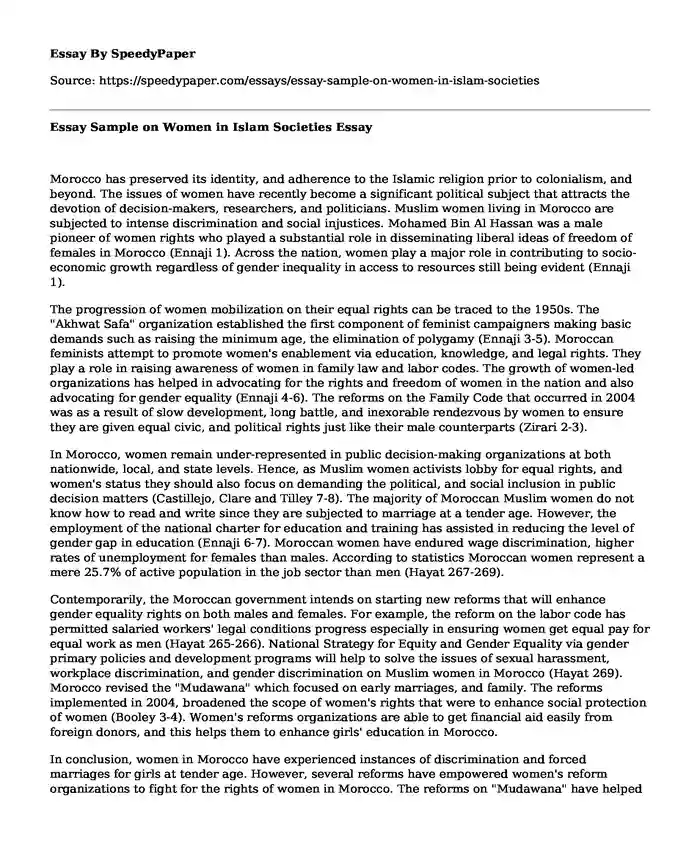
| Type of paper: | Essay |
| Categories: | Women Discrimination Islam |
| Pages: | 3 |
| Wordcount: | 720 words |
Morocco has preserved its identity, and adherence to the Islamic religion prior to colonialism, and beyond. The issues of women have recently become a significant political subject that attracts the devotion of decision-makers, researchers, and politicians. Muslim women living in Morocco are subjected to intense discrimination and social injustices. Mohamed Bin Al Hassan was a male pioneer of women rights who played a substantial role in disseminating liberal ideas of freedom of females in Morocco (Ennaji 1). Across the nation, women play a major role in contributing to socio-economic growth regardless of gender inequality in access to resources still being evident (Ennaji 1).
The progression of women mobilization on their equal rights can be traced to the 1950s. The "Akhwat Safa" organization established the first component of feminist campaigners making basic demands such as raising the minimum age, the elimination of polygamy (Ennaji 3-5). Moroccan feminists attempt to promote women's enablement via education, knowledge, and legal rights. They play a role in raising awareness of women in family law and labor codes. The growth of women-led organizations has helped in advocating for the rights and freedom of women in the nation and also advocating for gender equality (Ennaji 4-6). The reforms on the Family Code that occurred in 2004 was as a result of slow development, long battle, and inexorable rendezvous by women to ensure they are given equal civic, and political rights just like their male counterparts (Zirari 2-3).
In Morocco, women remain under-represented in public decision-making organizations at both nationwide, local, and state levels. Hence, as Muslim women activists lobby for equal rights, and women's status they should also focus on demanding the political, and social inclusion in public decision matters (Castillejo, Clare and Tilley 7-8). The majority of Moroccan Muslim women do not know how to read and write since they are subjected to marriage at a tender age. However, the employment of the national charter for education and training has assisted in reducing the level of gender gap in education (Ennaji 6-7). Moroccan women have endured wage discrimination, higher rates of unemployment for females than males. According to statistics Moroccan women represent a mere 25.7% of active population in the job sector than men (Hayat 267-269).
Contemporarily, the Moroccan government intends on starting new reforms that will enhance gender equality rights on both males and females. For example, the reform on the labor code has permitted salaried workers' legal conditions progress especially in ensuring women get equal pay for equal work as men (Hayat 265-266). National Strategy for Equity and Gender Equality via gender primary policies and development programs will help to solve the issues of sexual harassment, workplace discrimination, and gender discrimination on Muslim women in Morocco (Hayat 269). Morocco revised the "Mudawana" which focused on early marriages, and family. The reforms implemented in 2004, broadened the scope of women's rights that were to enhance social protection of women (Booley 3-4). Women's reforms organizations are able to get financial aid easily from foreign donors, and this helps them to enhance girls' education in Morocco.
In conclusion, women in Morocco have experienced instances of discrimination and forced marriages for girls at tender age. However, several reforms have empowered women's reform organizations to fight for the rights of women in Morocco. The reforms on "Mudawana" have helped to increase the number of women who are involved in education since it gave them freedom to choose when they will get married. Women's NGO has focused on enhancing equity in the access of basic amenities such as water, education, health care, and further urged for increased representation of women in political, and public spheres.
Works Cited
Booley, Ashraf. "The rights and freedoms of Moroccan women: has the 2004 reforms benefited Moroccan women?" Potchefstroom Electronic Law Journal/Potchefstroomse Elektroniese Regsblad 19.1 (2016). Retrieved from: file:///C:/Users/User/Downloads/The_Rights_and_Freedoms_of_Moroccan_Women_has_the_.pdf
Castillejo, Clare, and Helen Tilley. "The road to reform: women's political voice in Morocco." Overseas Development Institute. Retrieved from Developmentprogress. org (2015). Retrieved from: https://www.odi.org/sites/odi.org.uk/files/odi-assets/publications-opinion-files/9606.pdf
Ennaji, Moha. "Women, gender, and politics in Morocco." Social Sciences 5.4 (2016): 75. pp. 1-8. Retrieved from: file:///C:/Users/User/Downloads/socsci-05-00075.pdf
Hayat. "Women's Rights in Morocco: Assessment and Perspectives." pp. 264- 270 (2010). Retrieved from: https://www.iemed.org/anuari/2010/aarticles/Zirari_Women_en.pdf
Cite this page
Essay Sample on Women in Islam Societies. (2023, Feb 25). Retrieved from https://speedypaper.net/essays/essay-sample-on-women-in-islam-societies
Request Removal
If you are the original author of this essay and no longer wish to have it published on the SpeedyPaper website, please click below to request its removal:
- Art Essay Sample: Claude Monet's Beauties of Nature
- Youth and Society, Free Essay with an Article Summary
- Free Essay with the List of Methods Used in Qualitative Criminal Research
- Free Essay on Anti-Bribery Laws in Thailand
- The Deaf Culture Essay Sample
- American Government Essay Sample
- Meaning of the Name Jesus - Free Paper Sample
Popular categories




